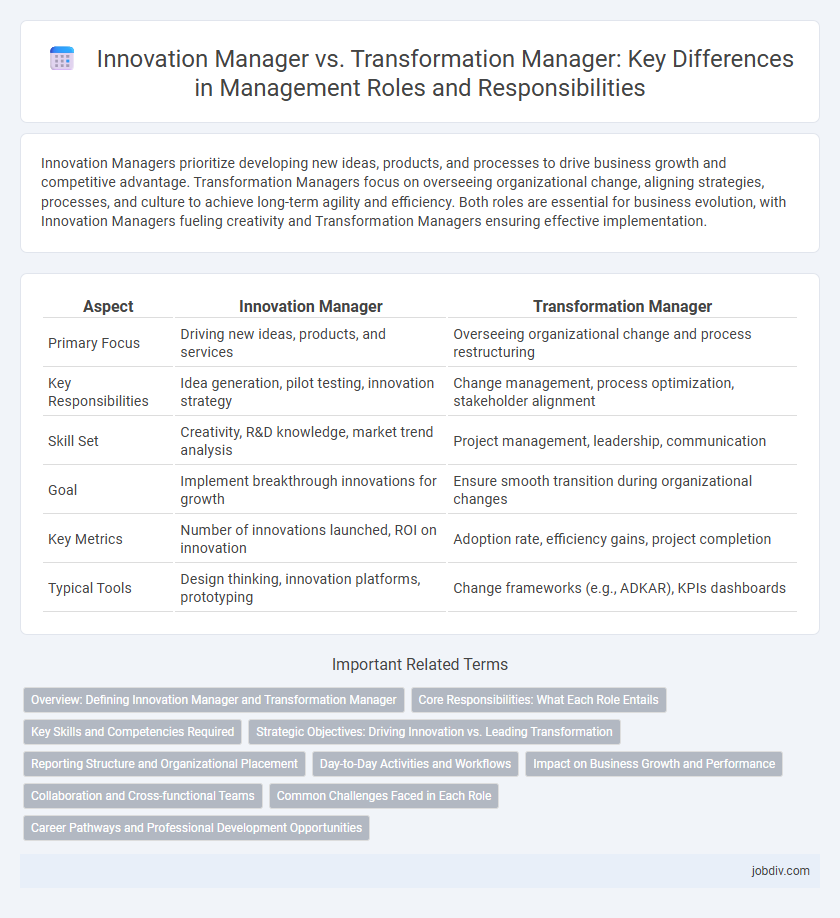Innovation Managers prioritize developing new ideas, products, and processes to drive business growth and competitive advantage. Transformation Managers focus on overseeing organizational change, aligning strategies, processes, and culture to achieve long-term agility and efficiency. Both roles are essential for business evolution, with Innovation Managers fueling creativity and Transformation Managers ensuring effective implementation.
Table of Comparison
| Aspect | Innovation Manager | Transformation Manager |
|---|---|---|
| Primary Focus | Driving new ideas, products, and services | Overseeing organizational change and process restructuring |
| Key Responsibilities | Idea generation, pilot testing, innovation strategy | Change management, process optimization, stakeholder alignment |
| Skill Set | Creativity, R&D knowledge, market trend analysis | Project management, leadership, communication |
| Goal | Implement breakthrough innovations for growth | Ensure smooth transition during organizational changes |
| Key Metrics | Number of innovations launched, ROI on innovation | Adoption rate, efficiency gains, project completion |
| Typical Tools | Design thinking, innovation platforms, prototyping | Change frameworks (e.g., ADKAR), KPIs dashboards |
Overview: Defining Innovation Manager and Transformation Manager
Innovation Managers lead the development and implementation of creative strategies to drive new product ideas, services, and business models, emphasizing research, experimentation, and market trends. Transformation Managers focus on orchestrating comprehensive organizational change by redesigning processes, culture, and technology to improve overall efficiency and adaptability. Both roles require strategic vision but differ in scope; Innovation Managers prioritize pioneering growth opportunities while Transformation Managers ensure seamless adaptation to evolving business landscapes.
Core Responsibilities: What Each Role Entails
An Innovation Manager focuses on identifying new opportunities, fostering creative ideas, and implementing breakthrough solutions to drive business growth and competitive advantage. A Transformation Manager oversees organization-wide change initiatives, ensuring alignment with strategic goals, managing stakeholder engagement, and optimizing processes to enhance operational efficiency. Both roles require strong leadership and collaboration skills but differ in scope, with innovation targeting product or service advancements and transformation addressing comprehensive organizational change.
Key Skills and Competencies Required
Innovation Managers excel in creativity, strategic thinking, and market trend analysis, driving the development of new products and services. Transformation Managers possess strong change management, leadership, and stakeholder engagement skills essential for executing large-scale organizational change. Both roles require adaptability and effective communication, but Innovation Managers prioritize ideation and experimentation while Transformation Managers focus on implementation and process optimization.
Strategic Objectives: Driving Innovation vs. Leading Transformation
Innovation Managers focus on developing and implementing new ideas, products, and processes to achieve competitive advantage and foster growth within the organization. Transformation Managers lead comprehensive change initiatives that realign business models, culture, and operations to meet long-term strategic goals and improve organizational agility. Both roles are critical in achieving strategic objectives, with Innovation Managers driving forward-thinking solutions and Transformation Managers ensuring effective adaptation to evolving market dynamics.
Reporting Structure and Organizational Placement
Innovation Managers typically report to the Chief Innovation Officer or Head of R&D, positioned within departments focused on product development or strategic growth, ensuring alignment with long-term innovation goals. Transformation Managers often report directly to the COO or CEO and are embedded within change management or operational excellence teams to drive cross-functional business transformation initiatives. Organizational placement differs as Innovation Managers are more embedded in future-oriented project groups, whereas Transformation Managers work across existing structures to implement organizational change.
Day-to-Day Activities and Workflows
Innovation Managers focus on generating new ideas, overseeing product development cycles, and fostering a culture of creativity through brainstorming sessions and prototyping initiatives. Transformation Managers concentrate on implementing large-scale organizational changes, coordinating cross-functional teams, and monitoring progress against strategic change objectives to ensure seamless integration. Both roles require close collaboration with stakeholders, but Innovation Managers prioritize ideation workflows while Transformation Managers emphasize execution and change management processes.
Impact on Business Growth and Performance
An Innovation Manager drives business growth by fostering creative solutions and spearheading new product development, directly impacting market differentiation and revenue streams. A Transformation Manager enhances performance through strategic change management and operational restructuring, optimizing processes to improve efficiency and scalability. Both roles are critical, yet while Innovation Managers prioritize breakthrough ideas for competitive advantage, Transformation Managers focus on sustainable execution and organizational agility.
Collaboration and Cross-functional Teams
Innovation Managers drive collaboration by fostering creative problem-solving across research, development, and marketing teams to generate new products and ideas. Transformation Managers lead cross-functional teams through change initiatives, aligning IT, operations, and human resources to implement organizational improvements and digital transformation. Both roles require strong communication and coordination skills to unify diverse teams toward common strategic goals.
Common Challenges Faced in Each Role
Innovation Managers frequently encounter challenges such as fostering a culture of creativity while balancing resource allocation and measuring the impact of new ideas on business growth. Transformation Managers often struggle with resistance to change from employees, aligning diverse stakeholders, and managing complex project timelines to achieve strategic objectives. Both roles require strong leadership and communication skills to overcome barriers and drive organizational success.
Career Pathways and Professional Development Opportunities
Innovation Managers typically advance from roles in product development or R&D, with career pathways emphasizing creative problem-solving and strategic thinking skills. Transformation Managers often emerge from operations or change management backgrounds, focusing on leadership in organizational change, process improvement, and stakeholder engagement. Professional development opportunities for Innovation Managers include workshops on design thinking and emerging technologies, while Transformation Managers benefit from certifications in change management methodologies and executive leadership training.
Innovation Manager vs Transformation Manager Infographic

 jobdiv.com
jobdiv.com